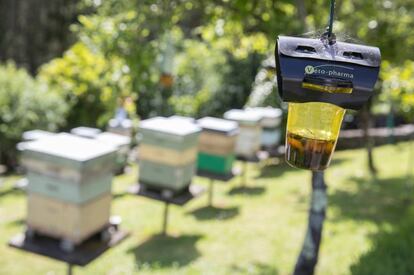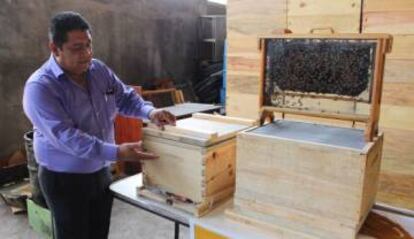The silent but deadly trail of the Asian hornet in Spain
Scientists battling to halt damaging invasion that began in the north of the country in 2010

Ever since the Asian predatory wasp or hornet (Vespa velutina) entered Spanish air space in 2010, something strange has been happening in the fields of the Cantabrian coastline in northern Spain. Scientists are not surprised at what local residents are reporting: a fall in the number of butterflies, flies, hornets and, above all, bees.

Honeybees are a gourmet dish to the Asian hornet, yet 70% of all crops for human consumption depend on the bees’ pollination work, says Greenpeace.
Everything suggests that the voracious insect, which originated in China and reached Spain via France, is winning the war against its native cousins.
Beekeepers are bracing for July, the month when the Asian hornets will be back to attack their hives
“People tell you that they are seeing a lot fewer insects, and the wasp traps confirm this: at first very few Asian hornets were getting caught, and a lot of other species. Now it’s the other way around,” explains Carlos Valcuende, of the Confederation to Defend Bees on the Cantabrian Coast.
In the seven years that these black-chested insects have been crisscrossing Spanish skies, not a single global report on their environmental and socioeconomic damage they are causing has been produced.
“It affects a very overlooked sector,” says a spokesperson at the Beekeepers Association of Guipúzcoa, in the Basque Country. “If it were attacking vineyards in France, or txacolí vines here, people would pay more notice.”

Basque and Galician beekeepers have come together to sponsor research on the damaged produced by the Asian hornet in their respective territories.
“We are drawing up an inventory of the queens we are capturing in Cantabria, but the study is of the homespun variety because we didn’t have enough funds for anything else,” says Valcuende. “The authorities should be doing this.”
In Galicia, where the number of detected swarms grew by 70% between 2015 and 2016, beekeepers have joined forces with the universities of A Coruña and Santiago, as well as with local authorities in A Coruña, to assess the damage produced by the Asian hornet in this northwestern province.
Xesús Astray, spokesman for the Galician Beekeepers Association, has some French friends who visit the region every four years, and they have noticed a change.
The Environment Ministry says that this is “a problem mostly for beekeepers”
“They see what we don’t: that Galicia is increasingly green but just green, without the colors contributed by flowers, and that is because there are fewer pollinating insects,” says Astray.
The Asian hornet has only added to the woes of the honeybee, whose extermination began in the 1990s due to the proliferation of pesticides, says Astray.
At some bee colonies, mortality rates have reached 50% since the arrival of the Asian hornet, and there has been a worrisome decline in production by the stressed honeybees that do survive the wasp attacks.
Meanwhile, the Environment Ministry says that this is “a problem mostly for beekeepers.”
“For now there is no evidence that it has any significant effects on the natural surroundings,” say official sources at the ministry.
Biological warfare
The industry has been “patching up” the problem with homegrown solutions, such as destroying nests and capturing the queens with all kinds of bait (including dark lager). But the wasp troops keep growing “exponentially,” and the battle will only be won when scientists tailor a specific bait for this insect.
Sandra Rojas, an expert on pollination biology, has been studying the Asian hornet invasion for four years. She explains that the traps used to date are not selective, and have also killed many native species.
“It is very likely that [the plague] will affect the entire food chain, because the creatures that normally eat the arthropods that Asian hornets hunt, such as spiders, birds or bats, now have less food.”
Scientists are now searching for a pheromone that will prove irresistible to the Asian hornets, and to them alone. Around 20 environmental, university and professional groups have teamed up in Galicia into a group called Stop Vespa Velutina to demand state funding for scientific research.
In the meantime, beekeepers are bracing for July, the month when the Asian hornets will be back to attack their hives.
English version by Susana Urra.
Tu suscripción se está usando en otro dispositivo
¿Quieres añadir otro usuario a tu suscripción?
Si continúas leyendo en este dispositivo, no se podrá leer en el otro.
FlechaTu suscripción se está usando en otro dispositivo y solo puedes acceder a EL PAÍS desde un dispositivo a la vez.
Si quieres compartir tu cuenta, cambia tu suscripción a la modalidad Premium, así podrás añadir otro usuario. Cada uno accederá con su propia cuenta de email, lo que os permitirá personalizar vuestra experiencia en EL PAÍS.
¿Tienes una suscripción de empresa? Accede aquí para contratar más cuentas.
En el caso de no saber quién está usando tu cuenta, te recomendamos cambiar tu contraseña aquí.
Si decides continuar compartiendo tu cuenta, este mensaje se mostrará en tu dispositivo y en el de la otra persona que está usando tu cuenta de forma indefinida, afectando a tu experiencia de lectura. Puedes consultar aquí los términos y condiciones de la suscripción digital.








































